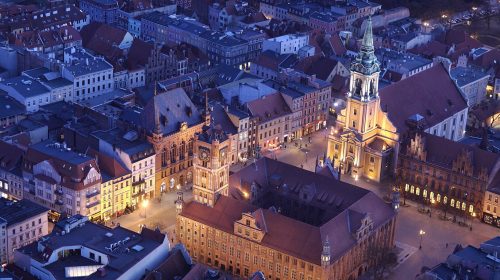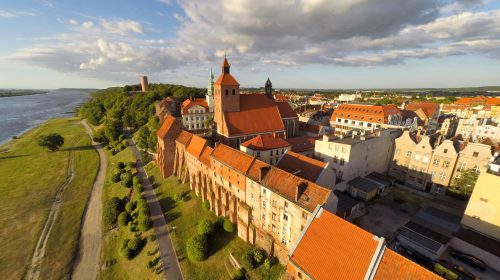Max Müller was born on 18th December 1887, in Chemnitz (Saxony). He came to Toruń in 1909, most likely from Königsberg, and found an apartment first on Wielkie Garbary 27, and then on Prosta 20. In 1911, he moved to Grudziądz, where, as it is generally assumed,
he opened his first cinema Weltbiograph. However, Grudziądz would become his home for merely a couple of years.
Nowadays, you would call such a person a local tycoon of sorts of the film industry. He was involved in various film businesses, made documentary films, he was a producer and cinematographer, and was also likely a scriptwriter.
In 1911, he established a film consortium under the name Vereinigte Müller’s Lichtspiele, which incorporated the following four cinemas: Welt Biograph, Zentral Theater (both located near the New-Town Market), Odeon Lichtspiele (established in 1913), located on ul. Prosta 5, and Metropol Lichtspiele (established in 1910), on ul. Warszawska. The latter of the four was the first ever cinema located on the outskirts of a city. In 1915, the cinema became part of the Müller’s consortium. Back then, his cinema-theatres stood out among others first and foremost, thanks to the number of seats they offered (600 seats). His company continued operating in Toruń, until 1921.
Before Müller created the consortium, his first step was to buy the Theater Lebenden Photographien established in 1907 at the New-Town Market, and changed its name to Welt Biograph. In February 1911, he started operating the Zentral Theater, which would later change its name quite frequently, following the incorporation of Toruń into the territory of Poland, and operated under its last name, the Corso Cinema, until 1937.
He is considered to be the author of the oldest film productions made locally, namely ,,Der Thorner Kornblumentag” from 1911 (“The Cornflower Day in Torun”) and the full-length film ,,Noc duchów” (“The Night of Ghosts”) from 1919.
The films he made were documents dedicated to preserving the life of the city and the most important public events. One of such films was the already mentioned „Der Thorner Kornblumentag” from 1911, in which the filmmaker documented a celebration involving both the military and the general public, when people living in Toruń and soldiers from the local garrison joined a procession going from the St. Catherine Garrison Church, all the way to the end of Bydgoskie Przedmiescie (Bydgoskie Outskirts), to lay cornflower wreaths at the monument of Otto van Bismarck stood. In the film, we see the accompanying celebrations, concerts given by a military band, a performance of a male choir from the Royal Teachers’ Seminar, as well as a concert and dancing at the Tivoli Restaurant. The whole city came to celebrate, with the exception of its residents of the Polish origin…
In 1913, Max Müller made another film, which documented celebrations of the 100th anniversary of the 21st Infantry Regiment, and the official governmental celebration of the 25th anniversary of the Emperor Wilhelm II. In his documents made during the First World War, the filmmaker portrayed scenes taking place in front of the Garrison Church, a concert given by the band of the 176th Infantry Regiment, the monument of the Emperor Wilhelm I erected in the Old Town, and celebrations in Viktoria Park.
In 1917, he immortalised the celebrations of the 70th birthday of Field Marshal Paul von Hindenburg. When mentioning this particular type of documentary films, it is worth taking note of a film, which portrays the day of reclaiming power in Toruń by the Poles. The film was made in January 1920.
Following the return of Toruń do the motherland, the Central Cinema-Theatre, formerly operating under the name Müller’s Zentral Theater, released three films, which documented the memorable events taking place in January 1920, namely: “The Arrival of the Polish Army in Toruńon 18th January 1920”, “The Arrival of the Government Representatives on 20th January 1920”, and “The Reception of General Haller on 21st January 1920”. Most likely, the author of the three films was Max Müller himself.
Selected Filmography:
- 1911 – „Dzień Bławatka w Toruniu” / “The Cornflower Day in Torun”
- 1919 – „Noc duchów” / “The Night of Ghosts”


